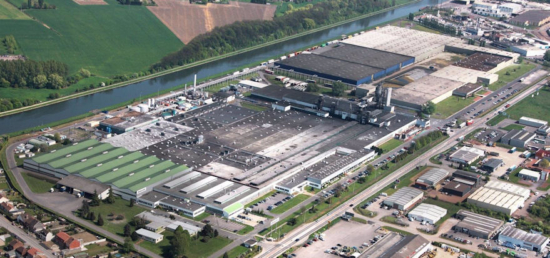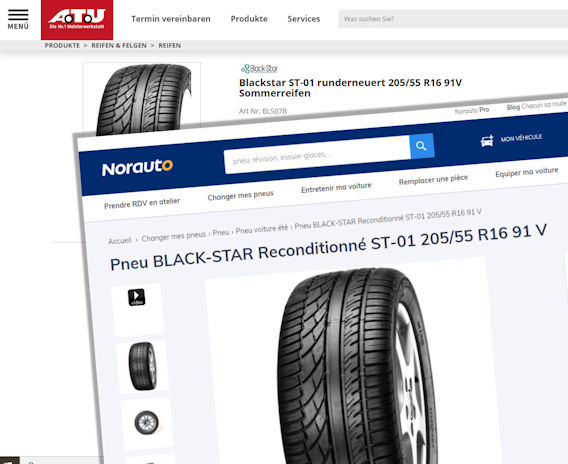Retreading at former Bridgestone plant
 The facility at the former Bridgestone Béthune plant site will begin retreading tyres from next January (Photo: Bridgestone)
The facility at the former Bridgestone Béthune plant site will begin retreading tyres from next January (Photo: Bridgestone)
The future of tyre making at the site of Bridgestone’s recently-closed Béthune plant in France has been secured by a deal signed in July between major European vehicle maintenance and mobility firm Mobivia and French retreading specialist Black Star. With support from Bridgestone, the partners are gearing up to retread car, SUV and light commercial vehicle tyres in Béthune – products that Bridgestone intends to sell through selected retail outlets. The project will commence in January and gradually ramp up; Mobivia’s communications manager, Laurie Lalloyer, informs us that the aim is to retread 900,000 tyres a year by 2025. By that time the project is expected to have created nearly 200 jobs, including employment for many former Bridgestone workers.
Mobivia subsidiary iWip and Black Star will develop an integrated tyre recycling ecosystem that occupies around 25 per cent of the Béthune site and utilises tyre making equipment that’s already there, including tyre building, curing and final finish machinery as well as automated equipment to sort used tyres. These used tyres will be collected from Mobivia’s auto centres, including Norauto, Midas and Carter Cash-branded outlets. Tyres passing entry control inspection will be retreaded and then offered for resale via a number of channels; Lalloyer says Mobivia is interested in marketing the retreads throughout the European Union. The tyres will be sold under the Black Star brand and potentially under a second brand name as well, she adds.
“After more than 20 years of developing 22 end-of-life management chains for used products from our Norauto, Midas, Carter-Cash, and ATU networks in Germany, we are entering a new era focused on extending the life of recuperated products,” states Fabien Derville, president of Mobivia’s Executive Board. “A few months ago, we started the regeneration of lead batteries to extend the life cycle of one third of used batteries. We are now pursuing this commitment with a focus on tyres, contributing to the growth of industries of the future across France, in particular in Hauts de France (the northerly region where Béthune is located), with a project that is at the very heart of Mobivia’s very purpose: ‘Opening sustainable mobility to all’.”
Four decades of retreading
Black Star has retreaded tyres since 1979 and currently employs approximately 30 people at its facility in Saint Pierre de Bœuf, Loire. The UTAC approved manufacturer offers mould cure retreaded summer, all-season and winter tyres for cars, SUV/4WDs and light commercial vehicles. All products comply with ECE R-108 and R-109. Mobivia began selling Black Star tyres in France via its Norauto centres last year and also offers them in Germany through its 2016-acquired ATU outlets.
Mobivia markets Black Star retreads through its outlets in France & Germany and plans to expands sales throughout the EU; Bridgestone intends to offer the range through its retail chains, at least in France
Operations in Béthune will run along similar lines to Black Star’s retreading in Saint Pierre de Bœuf, albeit incorporating the aforementioned Bridgestone production equipment. Jean-Baptiste Pieret, chief executive of Black Star S.A.S., describes the Béthune project as an “integrated ecosystem” for the collection, sorting, recycling and retreading of tyres. The new plant, he adds, is an “ambitious industrial project” that “aims to meet current environmental challenges and in response to simpler and more reasoned consumer expectations.”
Industrial hub in Béthune
Originally a Firestone plant, the Béthune site opened in 1961 and brought investment and employment to a region of northern France that had been hard hit by mining closures. The first Bridgestone tyre came out of the presses in 1991 following the company’s acquisition of Firestone three years prior, and at its peak Béthune employed around 1,300 people and held the capacity to produce 25,000 tyres a day.
Efforts to remain competitive over the past decade proved unsuccessful and the employee headcount gradually declined. By the time Bridgestone announced its intention to shut down the Béthune site in September 2020, the decision directly affected just 863 employees. The tyre maker said the decision to cease production there was a step to reduce its production overcapacity and improve cost efficiency. Closing the plant was, it stated, “the only viable path to safeguard the competitiveness of Bridgestone’s operations in Europe.”
After announcing the planned closure, Bridgestone and French public investment bank BPI contacted more than 700 companies in targeted sectors with a view to “transferring the benefit of the know-how of employees and the strengths of the Béthune site and its territory,” and last December it reported interest from two tyre makers. The Béthune site changed hands for a “token sum” following the signing on 20 April of an agreement with SIG, the real estate subsidiary of French logistics solutions group Log’S. Bridgestone France is now working with SIG to develop an industrial hub at the premises.
Mobivia and Black Star announced their new project on 2 July, just two months after Bridgestone’s final production shift on 30 April. Daniel Giroud, commercial director (CSO) and member of the Bridgestone EMIA Executive Committee in charge of finding solutions for takeover and new activities in Béthune, welcomes the project as “good news” that “turns the strategy to reindustrialise the site that began several months ago into a reality.”
Giroud adds that in addition to offering technical aid, Bridgestone is financially supporting the project by providing assistance for the hiring of former Béthune employees as well as by selling essential plant equipment for a nominal amount. Bridgestone will also distribute the retreaded tyres through its Speedy, First Stop and Côté Route outlets, however Mobivia Laurie Lalloyer stresses that these tyres won’t be branded as Bridgestone products.
The Béthune project, comments Daniel Giroud, fits with Bridgestone’s strategic objective to utilise 30 per cent sustainable materials by 2030 and 100 per cent by 2050; each retreaded tyre will save 9 kilogrammes of rubber and steel, a quantity that represents an 80 per cent saving in materials.
This article appeared in the September 2021 Retreading Special supplement that was jointly published by Tyres & Accessories and Germany’s Neue Reifenzeitung





Comments